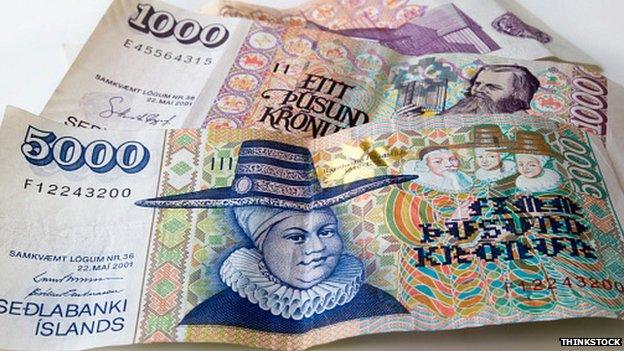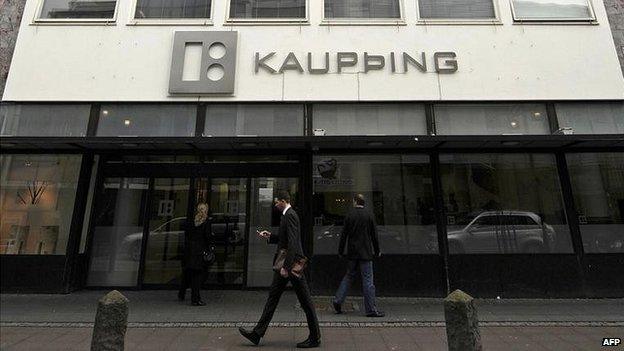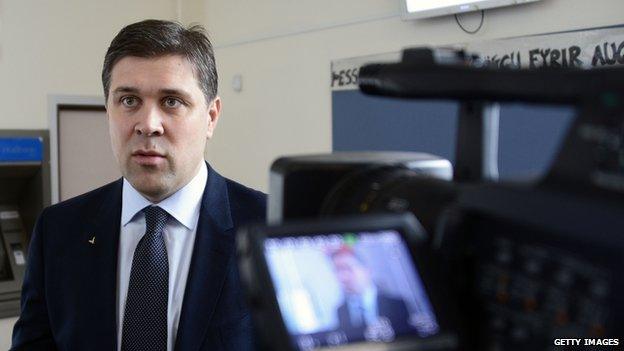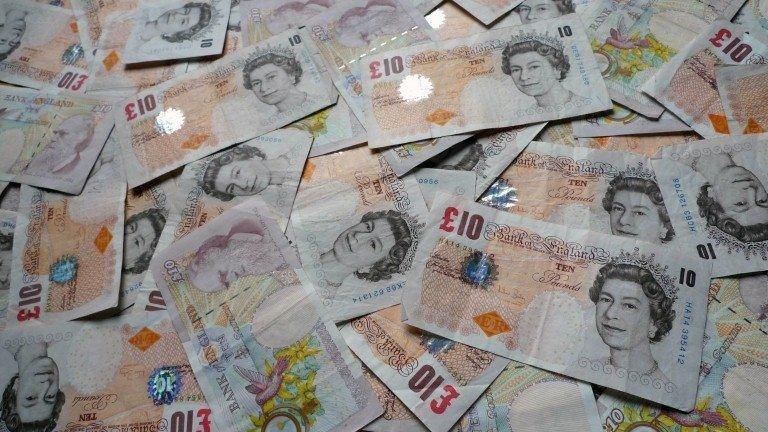Iceland's currency struggles to regain people's trust
- Published

The krona has halved in value since the banking crisis of 2008
Katla straightens a dark blue shirt on a hanger and smiles encouragingly at a customer who's tentatively trying on a summer jacket.
"It's crazy," she sighs. "We opened this shop just a week ago and we had to do it without a single loan from a bank - no one will lend you money here after the bank crash."
Katla's clothes shop, Oxney, is a boutique in central Reykjavik and she's clearly proud of the beautiful, original collection she's created by blending Icelandic and French designs. But she's worried about the future of her business.
"We're buying in clothes from France and it costs us double now to get stuff into the country because the krona is so weak."
"We have to pass on that cost to the customer," she says quietly. "The government really has to do something about the situation with the krona - it's so hard for businesses."
Uncertainty
Following the banking collapse of 2008, the value of Iceland's national currency plummeted by a half.

Iceland suffered a serious financial crisis in 2008, when Kaupthing bank collapsed
To stop it depreciating even further, the government imposed strict capital controls, restricting the flow of money in and out of the country. Even foreign currency for things like holidays abroad is now tightly rationed.
The move has certainly saved the national currency, but at what cost? The government, which promised the measures would only be temporary, still can't say when controls will be lifted.
"We're expecting 3.7% growth this year," insists Finance Minister Bjarni Benediktsson.
"All the economic indicators show we are bouncing back, slowly but surely. I honestly believe one of the lessons we have to learn from the past is that we should be happy with slow progress - we don't want to grab everything at once and have to give it all back as we had to do over the crisis year.
"We must be patient with the lifting of capital controls."
Alternative currency
But not everyone is prepared to wait. In an internet cafe in the centre of town, computer engineering student Hilmar Jonsson is proud to pay for his surfing session with Auroracoin, the Icelandic version of the crypto currency Bitcoin.
.jpg)
Student Hilmar Jonsson says the Icelandic people have lost faith in the krona
It was launched at the beginning of this year by an unidentified person going by the name Baldur Friggjar Odinsson, with the aim of providing Icelanders with an alternative currency to the krona that is free from government and bank controls.
"At the moment, the second-hand market and things like cyber cafes are the only places that accept Auroracoin," says Hilmar. "But you know, I've managed to buy a boat with it for summer camp."
Baldur has promised that every Icelander will be given 30 Auroracoin - beginning an "air drop" or electronic distribution of the currency in March, with a second drop expected soon.
Hilmar reads out extracts from Baldur's manifesto: "Capital controls…mean the Iceland economy is slowly bleeding. The people of Iceland are being sacrificed at the altar of a flawed financial system… Auroracoin will be free from the meddling of the politicians and their cronies. The power must be taken back from the politicians and given back to the people."
Hilmar is confident that the principle behind the Auroracoin will keep the crypto currency buoyant.
"The banks lost the trust of the Icelandic people - and this means that we lost faith in the krona," he explains.
"So why not have an alternative that is not controlled by the government - it might be better than the krona. Aurorocoin hasn't got the flow the currency needs yet but I think it has the potential."
'We're broke'
When the banks crashed, disposable income here fell by a quarter and 20,000 jobs were lost - a sizeable number in a country of only 320,000 people.
.jpg)
Iceland's economy relies on fishing and tourism to its dramatic landscapes
In Iceland, if you want to take the temperature of any situation, you head for the local swimming baths and hot tubs. Here, Jon, Svanna and Thor sink into the water, cowering from the wintry breeze swirling round their heads.
Svanna laughs at the notion that she is benefitting from an economic recovery.
"Recovery? We're broke! I don't buy anything except the essentials anymore and all holidays are inside Iceland - the krona doesn't travel!"
Jon agrees. "The krona sucks, ok? Give us the euro - or maybe the Canadian dollar, but the krona - it just does not work."
Greater controls
So should Iceland ditch its pride and call time on the national currency? That, says Mr Benediktsson, is simply out of the question.
"The krona is a viable solution for the future," he says, thumping his desk.

Finance Minister Bjarni Benediktsson wants to see Iceland solve its own problems
"Grabbing another currency to solve disciplinary problems is not a solution. I don't like the idea of importing discipline through a hard currency. I'd like to see Icelanders show discipline in running their own economy and that will benefit us greatly and stabilise the krona."
But the government does acknowledge that currency controls are hitting investment and spending power.
In a bid to encourage Icelanders to spend rather than save, it has just launched a mortgage debt relief scheme, financed largely through tax hikes on financial institutions and worth more than a billion dollars. The aim is to free up households from crippling repayment loans.
The obvious solution is to join the euro - after all, Iceland has pretty much been on a fast track scheme to join the European Union since 2009. But, following the government's and the Icelandic peoples' decision not to repay overseas investors who lost out in the banking crisis, a poisonous European diplomatic row ensued and the mood towards Brussels hardened.
Last year, the Icelandic coalition government announced it was halting EU accession talks. By default, it also renounced Iceland's claim on Euro membership.
Back in her shop in central Reykjavik, Katla stands at her cash register and raises her eyes to the heavens.
"This cannot go on," she warns. "The government has to do something about the krona - and quickly."
For more on this story, listen to the World At One on BBC Radio Four at 13:00 BST.
- Published5 February 2014

- Published12 December 2013
.jpg)